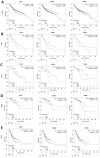Bioinformatic Analysis of IKK Complex Genes Expression in Selected Gastrointestinal Cancers
- PMID: 39337357
- PMCID: PMC11432643
- DOI: 10.3390/ijms25189868
Bioinformatic Analysis of IKK Complex Genes Expression in Selected Gastrointestinal Cancers
Abstract
Gastrointestinal cancers account for over a quarter of all cancer cases and are associated with poor prognosis and high mortality rates. The IKK complex (the canonical I kappa B kinase), comprising the CHUK, IKBKB, and IKBKG genes, plays a crucial role in activating the NF-kB signaling pathway. This study aimed to analyze publicly available bioinformatics data to elucidate the oncogenic role of IKK genes in selected gastrointestinal cancers. Our findings reveal that IKBKB and IKBKG are significantly upregulated in all examined cancers, while CHUK is upregulated in esophageal carcinoma and stomach adenocarcinoma. Additionally, the expression of IKK genes varies with histological grade and nodal metastases. For instance, in stomach adenocarcinoma, CHUK and IKBKB are upregulated in higher histological grades and greater lymph node infiltration. Lower expression levels of CHUK, IKBKB, and IKBKG in stomach adenocarcinoma and IKBKB in esophageal squamous cell carcinoma correlate with shorter overall survival. Conversely, in esophageal adenocarcinoma, reduced IKBKG expression is linked to longer overall survival, while higher IKBKB expression in colon adenocarcinoma is associated with longer overall survival. Given the significant role of IKK genes in the development and progression of selected gastrointestinal cancers, they hold potential as prognostic markers and therapeutic targets, offering valuable insights for clinical practice.
Keywords: CHUK; IKBKB; IKBKG; expression; gastrointestinal cancer; prognostic marker.
Conflict of interest statement
The authors declare no conflict of interest.
Figures









References
-
- Mukkamalla S.K.R., Recio-Boiles A., Babiker H.M. National Library of Medicine, National Center for Biotechnology Information, Esophageal Cancer. [(accessed on 7 July 2023)]; Available online: https://www.ncbi.nlm.nih.gov/books/NBK459267/
-
- Lotfollahzadeh S., Recio-Boiles A., Cagir B. National Library of Medicine, National Center for Biotechnology Information, Colon Cancer. [(accessed on 7 July 2023)]; Available online: https://www.ncbi.nlm.nih.gov/books/NBK470380/
MeSH terms
Substances
Grants and funding
LinkOut - more resources
Full Text Sources
Miscellaneous

